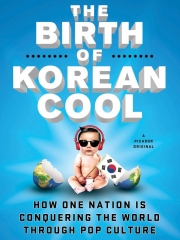The Birth of Korean Cool by Euny Hong
If I had to name one country that has significantly risen in the totempole of the world in the last ten years, it would be Korea. Yes, if we were talking about politics or economy, Korea wouldn’t even be an afterthought. But in terms of my daily life, Korea has undeniably conquered everything from smartphones, to music, to Korean drama (which my mom watches in the living room) to League of Legends to bulgogi. That said, I am not a particularly huge fan of Korea Inc. I still have an iPhone. I prefer ramen to bibimbap. Still, it’s telling how strong the Korean Wave (Hallyu) is when it inundates my life without my permission.
1) The economies of North Korea and South Korea were about the same size in the 1970s.
A strong theme that came through in this book, written by someone born in America but forced to move back to Korea in her school years, is that Korea was a dirt poor country not long ago. It’s not that surprising, but it goes to show how much a border can do.
2) Irony is the privilege of wealthy nations.
True. You need to have a firm standing before you can make fun of yourself.
3) Corporal punishment at schools was only made illegal in 2011.
I take her section on education with a grain of salt, but her comment that the number of times a student gets hit is his/her class rank is quite resounding. The government also only recently made private tutoring (hakwon) legal, fearing that rich kids would benefit more. Education is still a huge deal. In 2013, College Board canceled the SATs for the entire country because of cheating.
4) Kimchi used to not use red peppers, but salt got too expensive.
I also take this with a grain of salt. Hong also says that SARS helped the popularity of kimchi, as it has built a reputation for being healthy and good for your immune system. Korean food in general is becoming more popular, especially in the US, with David Chang at Momofuku, Hooni Kim at Danji, and Bobby Kwak inventing the bibimbap burger.
5) Han is a type of hatred towards fate exclusive to Koreans.
Hong portrays Han as a national mindset. She cites it as the reason that the country is able to work together. Koreans are all in it together – government, private companies, individuals. Koreans also take han out on the Japanese. South Korea even worked with North Korea to fight Japan over the Dokdo/Takeshima/Liancourt Rocks. The two rivals were also cohosts for the 2002 World Cup. This led to debates over naming, with some anecdotes of Korea changing their spelling to Corea so it came before J.
6) 1997 was a turning point.
In 1997, Korea got a loan from the IMF and determined that they would do everything possible to never have to resort to it again.
7) The government is a huge part of Kpop.
In 2009, the government used $91 million to save Kpop and implemented stricter controls over karaoke royalties. There is also a private investment fund for pop culture, meaning that both public and private stakeholders have huge bets on the success of Korea culture.Tracing the history of music in Korea, Hong says that modern Korean music started as entertainment for American soldiers, with the Kim Sisters being the first to perform on US national TV.
8) The government is a huge part of Kdrama and Kfilm.
Winter Sonata was the first drama that sparked the boom. The government knows what it’s doing, targeting 3rd world countries who will look to Korea when they develop. One huge part of the success of Kdrama is the government-funded effort of putting subtitles in. This allows people in the Middle East, South America, and Southeast Asia to watch. As for movies, the government also has minimum quotas for Korean films vs foreign films. However, movies like Oldboy have been so successful that the quota is only symbolic.
9) Conquering Japan is one of the most important strategies.
The two are rivals. In particular, Korea targeted the music market and Sony. Japan has the largest music market in the world – even bigger than the U.S. – since people still buy nicely-packaged CDs. Many Korean groups focus on the Japanese market and succeed, like TVXQ. Most of the top artists also release Japanese versions of their songs. As for beating Sony, Samsung used to have terrible quality, but also turned itself around and actually had a bigger market cap as far back as 2002.
10) Why did Korea succeed?
In Asia, one important psychological factor is that Korea has never done any wrong to its neighbors. They didn’t invade like Japan and don’t exert their power like China. Instead, it’s building extremely effective soft power through its cultural exports.
Hallyu is the full package. Like I said at the beginning, Korea can easily be part of all aspects of your life. Electronics. Food. Entertainment. It’s about subscribing to the Korean brand. Just like Apple, Korea has built an ecosystem.
Korea benefitted from luck and timing. They bet on digital when the world decided to abandon analog. The internet was coming together, which allowed Korean culture to spread.
Most of all, the government has been consciously making good decisions. They know the future. They knew their internet had to be good, so Korea has the fastest speeds in the world. They are not afraid to poke their nose into industries. Kpop, TV, movies, and Samsung all got huge boosts from the government.
The Birth of Korean Cool is a quick, light read. The book is almost all positive, which is to be expected from the title. I didn’t really like Korea when I went this summer, but now I kind of want to go again.
